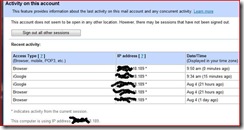Your email account contains a lot of personal information, from private, personal letters to business documents. Email that you (probably) don't want other people to see.
If you are anything like me, you probably sign in to your Inboxes from multiple computers. I, for example, occasionally sign into my e-mail accounts from a friend's computer, or when traveling, a public computer. As a security paranoid kind of guy, I am sure to sign out before I leave... but every once in a while I wonder if I really did.
Thanks to a new feature in Gmail, I no longer have to wonder about that particular account; with this, I can now track my recent sessions and sign myself out remotely if I somehow forgot to do so.
At the bottom of your inbox page, you'll see information about the time of the last activity on your account and whether it's still open in another location. 
By glancing at this from time to time, I can see if something "doesn't jibe"; like, my account was accessed 15 minutes ago, and I haven't logged on yet today (that would be a pretty good indication that someone has gotten hold of my logon, and is reading my mail!).
To really see what's going on, I click on the "Details" link. 
And here I can see my activity history, the IP Addresses that accessed my account (a "*" indicates a match to my current IP), and what type of connection was made. This info can help determine if (and who) unauthorized access is occurring.
But what I like best is the "Sign out all other sessions" button. Clicking this will disconnect any other machines which are logged on by remote control... say, if I did walk away from a session without logging off.
This feature, and the "always use https" setting featured in yesterday's article, may make security-conscience Hotmail and Yahoo Mail users consider the switch to Gmail. (It has more storage, too.)
Today's free link: 5-Star rated DriverMax is a powerful free utility which helps you download, backup and restore the drivers installed on your Windows Vista or Windows XP computer and check if newer versions are available. This tool can save you a lot of time when reinstalling Windows, especially on older computers for which the original CDs containing the drivers have been lost. You no longer have to track down old driver installation CDs, or spend hours searching for drivers on the Internet. DriverMax is also able to display a detailed report about all drivers (versions, release dates) installed on your system. And will help identify unknown devices in your computer.
Copyright 2007-8 7copy Tech Paul. All rights reserved.![]() post to jaanix
post to jaanix


No comments:
Post a Comment